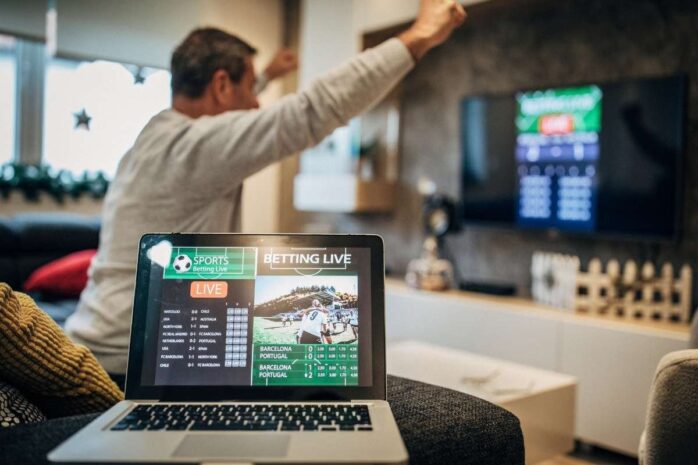Live sports betting is changing the way fans experience games. No longer do you simply watch your favorite team—you can place wagers in real time, reacting to every shot, foul, or turnover as it happens. This interactivity makes sports even more thrilling, but it also introduces new risks.
While live betting can heighten excitement, it is equally important to understand why it is so addictive and how to protect yourself from losing control.
Contents
The Rush of the Moment

With traditional betting, wagers are locked in before the whistle blows. Live betting, on the other hand, keeps you fully engaged from start to finish. Every play reshapes the odds, pulling you deeper into the game.
Instead of being just a spectator, you feel like a participant whose decisions matter. Each shift in odds delivers a burst of adrenaline, linking the excitement of the sport directly to the risk of betting. Over time, this constant rush makes betting itself feel like a core part of the sporting experience—not just an extra.
The Illusion of Control

One of the strongest hooks of live sports betting is the belief that you can predict outcomes by watching closely. Many fans think, “I see what’s happening, so I know what comes next.”
But no matter how much you follow the game, sports remain unpredictable. A single referee call or player mistake can flip everything upside down. Psychologists refer to this as the “illusion of control”—a cognitive bias that convinces you your knowledge gives you an edge when, in reality, outcomes are still random.
This false confidence often leads to higher risks and more frequent wagers, even when the odds are stacked against you.
Chasing Losses Faster
The biggest danger of live betting lies in its pace. Odds shift every few seconds, which means the temptation to place back-to-back bets is constant. When you lose, it’s easy to think you can win it back on the very next play.
This cycle—known as chasing losses—can quickly spiral out of control. Unlike traditional betting, where you have hours or even days before the next wager, live betting offers only seconds. The lack of reflection time increases the chance of emotional and reckless decisions, often leading to even bigger losses.
How Your Brain Reacts

Live sports betting doesn’t just feel exciting—it literally stimulates your brain’s reward system. Each unpredictable outcome releases dopamine, the same chemical linked to pleasure and motivation.
What’s even more fascinating is that the anticipation of a win often produces more dopamine than the win itself. That’s why near-misses keep bettors hooked: your brain interprets them as being “close” to success, fueling the urge to try again.
It’s the same cycle that makes slot machines addictive—fast results, quick highs, and constant reinforcement.
Staying Smart with Live Sports Betting
Live betting doesn’t have to control you. With the right approach, it can remain an entertaining part of watching sports rather than a harmful habit.
1. Set a Budget Beforehand
Treat betting money like entertainment money. Decide how much you can afford to lose before the game begins, and never exceed it. Once that limit is reached, consider the session over.
2. Control the Pace
Odds may move fast, but you don’t have to. Step away from the screen, stretch, or set a timer to pause every 30 minutes. Small breaks give your brain time to reset and prevent impulse bets.
3. Bet for Fun, Not to Recover
Healthy betting means enjoying the process whether you win or lose. If you’re betting to chase losses, it’s a red flag. The moment betting becomes more about desperation than fun, it’s time to stop.
4. Quit While Ahead
Winning can be just as risky as losing if it leads to overconfidence. Many smart bettors set “win goals” along with “loss limits.” For example, if you double your initial stake, cash out and celebrate the success instead of risking it all.
5. Know When to Seek Help
If betting begins to feel like an obligation or starts affecting your finances, relationships, or mood, it’s time to act. One of the best steps is to get therapy for gambling addiction. Professional services and support groups can provide confidential help, tools, and guidance to regain balance.
Seeking help is not a weakness—it’s a powerful way to take control of your life and enjoy sports the way they’re meant to be enjoyed.
Sports Are About More Than Bets

At its best, sports bring people together—through competition, passion, and community. Live betting can enhance the thrill, but only when approached with responsibility.
When you treat gambling as entertainment—not as income—you ensure the game remains fun and free of unnecessary stress. Setting limits, recognizing risks, and stepping away when needed are the keys to keeping live sports betting safe.
Final Thoughts
Live sports betting is exciting because it thrives on unpredictability and adrenaline—the same qualities that make sports so captivating in the first place. But those qualities can also make it addictive if you’re not careful.
The smartest bettors are not the ones who always win, but the ones who know their limits, protect their finances, and value the love of the game above the wager.
In the end, betting should enhance your experience of sports, not control it. Stay disciplined, stay aware, and you’ll keep the thrill of live betting in its rightful place—just another way to enjoy the game.
















